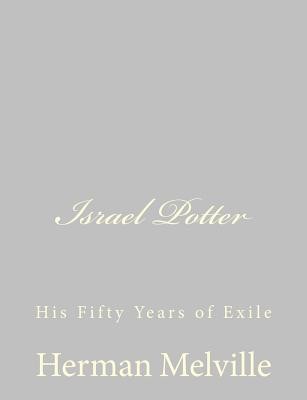
- We will send in 10–14 business days.
- Author: Herman Melville
- Publisher: CreateSpace Independent Publishing Platform
- Year: 2013
- Pages: 162
- ISBN-10: 1484885503
- ISBN-13: 9781484885505
- Format: 18.9 x 24.6 x 0.9 cm, softcover
- Language: English
- SAVE -10% with code: EXTRA
Reviews
Description
Israel Potter - His Fifty Years of Exile By Herman Melville. Classic Herman Melville. Israel Potter: His Fifty Years of Exile (1855) is the eighth novel by American writer Herman Melville, and his first serialized one, in installments in Putnam's Monthly Magazine from July 1854 through March 1855, in book form by George Palmer Putnam in New York in March 1855, and in a pirated edition by George Routledge in London in May 1855. It is loosely based on a pamphlet (108-page) autobiography that Melville acquired in the 1840s, Life and Remarkable Adventures of Israel R. Potter (Providence, Rhode Island, 1824). At about 60,000 words, the novel is much shorter than the major novels but significantly longer than two of Melville's greatest stories, "Bartleby, the Scrivener" and "Benito Cereno," which were written during the same period and included the following year in The Piazza Tales. It followed the disastrous critical and commercial failure of his previous novel, Pierre: or, The Ambiguities. Melville disliked the finished work, and claimed that he wrote it as quickly as possible for the money. Marred by a passive, colorless and astonishingly unlucky hero and a depressingly anti-climactic ending, this novel of the American Revolution was nevertheless a total commercial failure. In recent years, however, many critics have attempted to argue that the novel shows Melville comfortable in his narrative powers and indulging his considerable talents for humor, sly characterization, episodic action, and unsettling understatement. It is one of his easiest books to read, which is all the more surprising in that it was followed by perhaps his most difficult prose work, The Confidence-Man, in 1857.
- Author: Herman Melville
- Publisher: CreateSpace Independent Publishing Platform
- Year: 2013
- Pages: 162
- ISBN-10: 1484885503
- ISBN-13: 9781484885505
- Format: 18.9 x 24.6 x 0.9 cm, softcover
- Language: English English
Israel Potter - His Fifty Years of Exile By Herman Melville. Classic Herman Melville. Israel Potter: His Fifty Years of Exile (1855) is the eighth novel by American writer Herman Melville, and his first serialized one, in installments in Putnam's Monthly Magazine from July 1854 through March 1855, in book form by George Palmer Putnam in New York in March 1855, and in a pirated edition by George Routledge in London in May 1855. It is loosely based on a pamphlet (108-page) autobiography that Melville acquired in the 1840s, Life and Remarkable Adventures of Israel R. Potter (Providence, Rhode Island, 1824). At about 60,000 words, the novel is much shorter than the major novels but significantly longer than two of Melville's greatest stories, "Bartleby, the Scrivener" and "Benito Cereno," which were written during the same period and included the following year in The Piazza Tales. It followed the disastrous critical and commercial failure of his previous novel, Pierre: or, The Ambiguities. Melville disliked the finished work, and claimed that he wrote it as quickly as possible for the money. Marred by a passive, colorless and astonishingly unlucky hero and a depressingly anti-climactic ending, this novel of the American Revolution was nevertheless a total commercial failure. In recent years, however, many critics have attempted to argue that the novel shows Melville comfortable in his narrative powers and indulging his considerable talents for humor, sly characterization, episodic action, and unsettling understatement. It is one of his easiest books to read, which is all the more surprising in that it was followed by perhaps his most difficult prose work, The Confidence-Man, in 1857.


Reviews